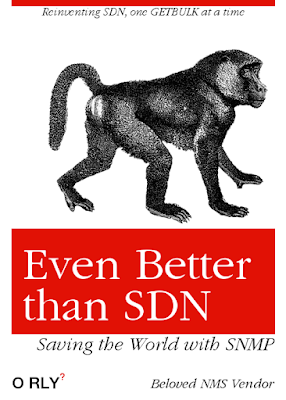Breaking News: SNMP-based NMS Can Replace SDN ;)
Got this remark from one of my SDN mailing list subscribers:
There are NMSs that are based on SNMP, their manufacturers that say they can replace an SDN architecture, because they allow to automate the management of the network.
O’RLY?
This is one of those “Our idea looks so awesome in PowerPoint” moments. Unfortunately, the reality tends to disagree with such claims. What I would love to ask those vendors (and I would love to know who they are) is:
- What have they been doing the last 30 years?
- Why are our networks still not fully automated after all this time?
- What is all this SDN brouhaha about if they already solved the problem with SNMP?
I wonder what the answers would be ;))


A: For most people "not in IT business" the "call a contractor to do it" is pretty much the equivalent of automation. Besides, you can yell "just make the damn thing work" to a human contractor, but not to an automation tool !
For those that do handle some IT internally (lower the use of contractors) there's the balance between getting random things done fast and working on automation, but it will need some time before that balance get to the correct point.... like the time to get rid of all "network guys" that never learned how to write a line of code - and there's armies of them.
It had it's quirks but to date I've never seen anything quite like it. I saw many customers who's primary interaction with their ALU IP/MPLS network was through this tool and it's API, including things like doing mass-provisioning of leased lines and subscriber profiles.
The pattern I noticed however was customers would use it to automate a few specific things (i.e. provision customer circuits, run audits) but wouldn't bother with full config management and deployment of their network. I.e. they would solve their 80% and ignore the rest. Depending on the customer and their business needs it's hard to argue against that choice.
So, I would argue that yes, this is possible and in some specific sectors it has produced decent automation results. But this was due to pure business need: provisioning a ton of highly repeatable services that make money quickly and accurately.